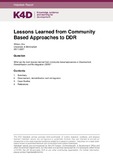| dc.contributor.author | Avis, William | |
| dc.date.accessioned | 2022-07-29T14:17:10Z | |
| dc.date.available | 2022-07-29T14:17:10Z | |
| dc.date.issued | 2021-11-05 | |
| dc.identifier.citation | Avis, W. (2021). Lessons Learned from Community Based Approaches to DDR. K4D Helpdesk Report No. 1062. Institute of Development Studies. DOI: 10.19088/K4D.2022.077 | en |
| dc.identifier.uri | https://opendocs.ids.ac.uk/opendocs/handle/20.500.12413/17585 | |
| dc.description.abstract | The review illustrates that DDR programming has evolved significantly in response to changing situations and emerging challenges; from traditional DDR programmes implemented in post-conflict situations where a peace accord was in place and involved defined armed groups to second generation programmes, which have emerged to address less stable peace situations and engage communities, not just combatants. More flexible, ‘third generation’ DDR programmes, wider in scope and negotiated based on the local context, have also been identified. Despite this evolution, many challenges remain in designing and implementing DDR programmes, particularly those that seek to support a community based approach to reintegration. | en |
| dc.description.sponsorship | Foreign, Commonwealth and Development Office (FCDO) | en |
| dc.language.iso | en | en |
| dc.publisher | Institute of Development Studies | en |
| dc.relation.ispartofseries | K4D Helpdesk Report;1062 | |
| dc.rights.uri | https://www.nationalarchives.gov.uk/doc/open-government-licence/version/3/ | en |
| dc.subject | Security and Conflict | en |
| dc.title | Lessons Learned from Community Based Approaches to DDR | en |
| dc.type | Helpdesk | en |
| dc.rights.holder | © Crown copyright 2021 | en |
| dc.identifier.doi | 10.19088/K4D.2022.077 | |
| dcterms.dateAccepted | 2021-11-05 | |
| rioxxterms.funder | Department for International Development, UK Government | en |
| rioxxterms.identifier.project | K4D | en |
| rioxxterms.version | VoR | en |
| rioxxterms.versionofrecord | 10.19088/K4D.2022.077 | en |
| rioxxterms.funder.project | 238a9fa4-fe4a-4380-996b-995f33607ba0 | en |

